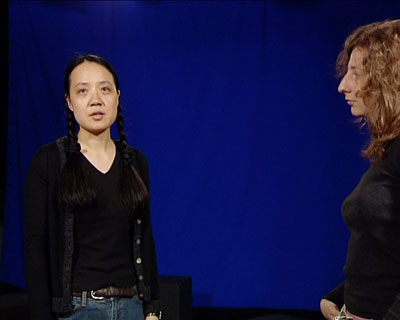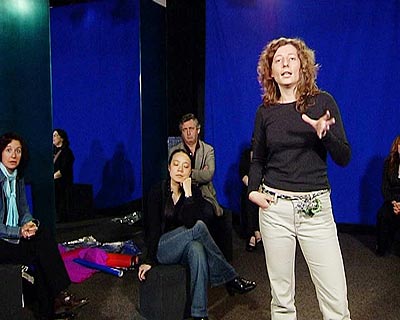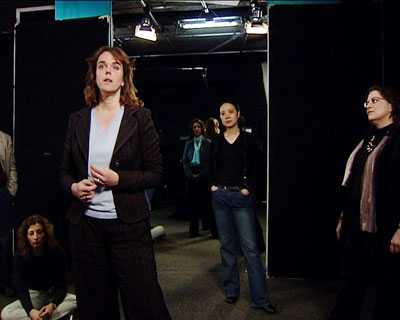“The strength of the system and my experiences of it, was that in fact, oddly enought, it was actually a very collaborative enterprise already”, 2006
Video: 35 mins
“The Strength of the System and My Experiences of It” is a 35-minute video. The work features a group of performers in a studio and seminar setting. The performers address the camera individually, sharing their thoughts on their own art-making processes and reflecting on their roles as educators within institutional frameworks. The script draws from real interviews with artist-teachers, who highlight the collaborative and performative aspects of teaching, as well as its subversive potential. This video critiques the commodification of art education while also emphasizing the contradictions and complexities of working within the system
Based on interviews with:
Kaucyla Brooke, Brian Chatwin, Marcia Farquar, Michael Hauffen, Peter Suchin, Sari Tervaniemi.
Performed by: Suzanne Bon, Mansel David, Anna Rogalska Hedlund, Bo Nierhaus, Rosi Oelkers, Alison Sandford-Mackenzie, Sabine Roseburg
See also:
>> Susanne Clausen, Teaching as ... , ADM-HEA, 2004
excerpts from the script:
“The strength of the system, my experiences of it, was that in fact, oddly enough, it was actually a very collaborative enterprise already. In the sense that if you put a lot of people together in an art school, sometimes all in a same room. And artists, being what they are they feed off each other, like crazy. (…) You are actually involved in this ongoing dialogue. (...) It’ s very lively. (…) And its proven that the that when people leave the school, they become perplexed, especially when they are being thrown into an isolated studio in the East End. All of that kind of interaction has disappeared and they are suddenly truncated. They are in the position of being an isolated individual.”
(…)
“I taught or started to teach because I needed an a job. I never felt secure enough to, for example, just move to New York and take a bunch of off jobs, to piece together some kind of living, to try and enter that very hard and intense urban art scene. (…) I wanted to enough of an income that I could depend on it, to know that I would have a certain vacation schedule in a way. The other thing that appealed to me was the kind of work and pleasure in following students research.”
(…)
“Using your mind to do research for students, (…) the work you do to keeps your brains harp, (…) as in teaching the better for your whole creative process. Whatever happens in your brain you know you have to think of new channels. And this is what I’m interested to do in my life. “
(…)
“A lot of times with my friends we have said, wow, if we could only start our own school, you know then it could be exactly the way we want to be. And then I’ve never been quite sure about that, because those same friends have been on hiring committees and then have not hired the people who would presumably be the ones that would all start the school with together. There is some thing that is so political about the art world, you know, in terms of way, that people, colleagues, do and don’t support each other, and that’s the thing that I, I don’t know how I would change it, but I think it would make a big difference, if you worked in a place (and there are many places that are much harsher to be than CA, in some way) but it would be really amazing to work in a place where your colleagues were supportive and interested in what you are working on.
And you also were the same towards your colleagues and the administration was also supportive and interested in what you were working on. And the students, you know, felt instead of, like consumers, which is now a lot of the position of students, especially it they are paying for their education, instead of feeling like consumers (I’m not sure if I’m getting my money’s worth) the students were in a way, just a part of the project. Excited to be working around working faculty and administration that was engaged with, …, or celebrating the work the faculty was doing. That sounds very huggy-kissy, but I mean it in a way, of being informed about what the faculty are doing and to engage in the intellectual aspect of the project and also finding ways for the faculty to get more exposure, better fitting venues, etc.
(…)
![]()
![]()
![]()
Video: 35 mins
“The Strength of the System and My Experiences of It” is a 35-minute video. The work features a group of performers in a studio and seminar setting. The performers address the camera individually, sharing their thoughts on their own art-making processes and reflecting on their roles as educators within institutional frameworks. The script draws from real interviews with artist-teachers, who highlight the collaborative and performative aspects of teaching, as well as its subversive potential. This video critiques the commodification of art education while also emphasizing the contradictions and complexities of working within the system
•
It was exhibited as part of a group
show focused on the “Educational Turn,” exploring the relationship between art
practice and institutionalized learning, and reflecting on the political
dynamics within these environmentsBased on interviews with:
Kaucyla Brooke, Brian Chatwin, Marcia Farquar, Michael Hauffen, Peter Suchin, Sari Tervaniemi.
Performed by: Suzanne Bon, Mansel David, Anna Rogalska Hedlund, Bo Nierhaus, Rosi Oelkers, Alison Sandford-Mackenzie, Sabine Roseburg
See also:
>> Susanne Clausen, Teaching as ... , ADM-HEA, 2004
excerpts from the script:
“The strength of the system, my experiences of it, was that in fact, oddly enough, it was actually a very collaborative enterprise already. In the sense that if you put a lot of people together in an art school, sometimes all in a same room. And artists, being what they are they feed off each other, like crazy. (…) You are actually involved in this ongoing dialogue. (...) It’ s very lively. (…) And its proven that the that when people leave the school, they become perplexed, especially when they are being thrown into an isolated studio in the East End. All of that kind of interaction has disappeared and they are suddenly truncated. They are in the position of being an isolated individual.”
(…)
“I taught or started to teach because I needed an a job. I never felt secure enough to, for example, just move to New York and take a bunch of off jobs, to piece together some kind of living, to try and enter that very hard and intense urban art scene. (…) I wanted to enough of an income that I could depend on it, to know that I would have a certain vacation schedule in a way. The other thing that appealed to me was the kind of work and pleasure in following students research.”
(…)
“Using your mind to do research for students, (…) the work you do to keeps your brains harp, (…) as in teaching the better for your whole creative process. Whatever happens in your brain you know you have to think of new channels. And this is what I’m interested to do in my life. “
(…)
“A lot of times with my friends we have said, wow, if we could only start our own school, you know then it could be exactly the way we want to be. And then I’ve never been quite sure about that, because those same friends have been on hiring committees and then have not hired the people who would presumably be the ones that would all start the school with together. There is some thing that is so political about the art world, you know, in terms of way, that people, colleagues, do and don’t support each other, and that’s the thing that I, I don’t know how I would change it, but I think it would make a big difference, if you worked in a place (and there are many places that are much harsher to be than CA, in some way) but it would be really amazing to work in a place where your colleagues were supportive and interested in what you are working on.
And you also were the same towards your colleagues and the administration was also supportive and interested in what you were working on. And the students, you know, felt instead of, like consumers, which is now a lot of the position of students, especially it they are paying for their education, instead of feeling like consumers (I’m not sure if I’m getting my money’s worth) the students were in a way, just a part of the project. Excited to be working around working faculty and administration that was engaged with, …, or celebrating the work the faculty was doing. That sounds very huggy-kissy, but I mean it in a way, of being informed about what the faculty are doing and to engage in the intellectual aspect of the project and also finding ways for the faculty to get more exposure, better fitting venues, etc.
(…)





